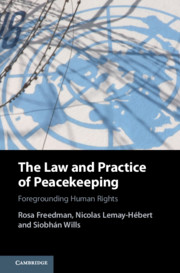Book contents
- The Law and Practice of Peacekeeping
- The Law and Practice of Peacekeeping
- Copyright page
- Contents
- 1 Introduction
- 2 A Political History of UN Involvement in Haiti
- 3 Integrating Human Rights Norms into UN Peacekeeping Practice
- 4 UN Immunities and Human Rights
- 5 The Cholera Epidemic
- 6 Sexual Exploitation and Abuse
- 7 UN Peacekeepers’ Use of Deadly Force to Maintain Law and Order
- 8 Conclusion
- Index
2 - A Political History of UN Involvement in Haiti
Published online by Cambridge University Press: 28 May 2021
- The Law and Practice of Peacekeeping
- The Law and Practice of Peacekeeping
- Copyright page
- Contents
- 1 Introduction
- 2 A Political History of UN Involvement in Haiti
- 3 Integrating Human Rights Norms into UN Peacekeeping Practice
- 4 UN Immunities and Human Rights
- 5 The Cholera Epidemic
- 6 Sexual Exploitation and Abuse
- 7 UN Peacekeepers’ Use of Deadly Force to Maintain Law and Order
- 8 Conclusion
- Index
Summary
The United Nations (UN) Stabilisation Mission in Haiti’s (MINUSTAH) official mandate as set out in UN Security Council Resolution 1542 (2004) is to ‘build state capacity’ by ‘extending state authority throughout Haiti’ and by ‘ensur[ing] a stable and secure environment’. In order to understand the state-building mandate, it is important first to understand the specific nature of the Haitian state. The Haitian state has long been considered a perennial ‘failed state’ and has been described variously as a nightmare, predator, collapsed, failed, failing, parasitic, kleptocratic, phantom, virtual, pariah state, or even ‘a basket-case’. This discourse of Haiti as a failed state is both reductive and simplistic, and more importantly passes over, through its silence, the role of international actors in the Haitian state-building process. While it may appear intuitive to label Haiti ‘failed’ – after all, everyone, local politicians included, recognises that the Haitian state is not up to the task – semantics has tangible implications and, maybe more importantly, specific limitations. We suggest four limitations here as applied to the specific case of Haiti, which will inform the theoretical stance of this book.
- Type
- Chapter
- Information
- The Law and Practice of PeacekeepingForegrounding Human Rights, pp. 13 - 33Publisher: Cambridge University PressPrint publication year: 2021

